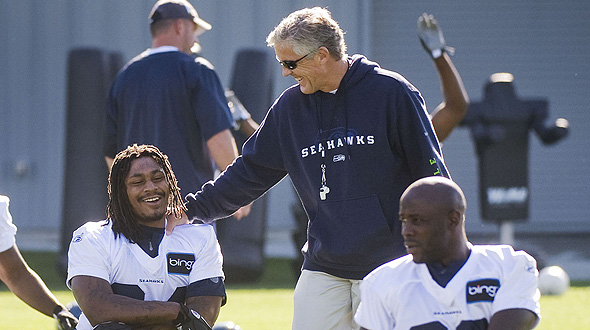
When Minnesota Vikings head coach Brad Childress stepped to the podium Wednesday and attempted to explain the reasons he had for dumping Randy Moss back on the open market, he did so with all the eroded confidence of a man who long ago mortgaged any authority he had in his current position.
Between picking up a diva quarterback at the airport, and encouraging teammates of the diva quarterback to fly down to the diva quarterbacks compound to get him to join the team, Childress established an ethical ambiguity in which winning by any means necessary often meant doing things the wrong way.
Childress recent press conference disclosures on Brett Favre and the fact that he allegedly released Moss without consulting the teams owner, pointed to a situation in which a man with no real juice in the Vikings scheme was trying desperately to regain authority he never really had. Childress cut Moss less than a month after asking the fan base to embrace him, and responded defensively to the idea that once again, he was playing both ends against the middle.
I have to answer for my decisions, he said today. In the long run with ownership, obviously, my name is affixed to wins and losses. So, it’s not an attempt to deceive, it’s just a matter of letting the people know that need to know. And when we came out with the statement, that’s when all that had been done. That’s why [Moss] didn’t show up on the waiver wire that day, just because there is a process that’s involved.”
Childress confusion (exacerbated by his ongoing schism with Favre) pointed to a balancing act engaged in by coaches and general managers. They are obliged to win or be fired, but how much bad behavior is too much when it comes to hiring superior physical talents?
New York Giants head coach Tom Coughlin has long been known as a disciplinarian, but he had to modify his approach to a degree for his 2007 team to buy into his approach and eventually win Super Bowl XLII. When asked about that balance, Coughlin pointed to the belief structure every successful team must possess.
Its an answer that certainly requires more than a one-liner, he said in a conference call on Wednesday. I just think that you have those (behavioral) issues you certainly have what you stand for, and you certainly talk to people before you bring (those types of players) in and tell them exactly what your beliefs are , what your thoughts are, and you try to do a good job with it. It doesnt always work out, and we all know that. But you have to stand for something. You have to set the standards, and then, the whole program revolves around that.”
Seahawks head coach Pete Carroll, during his Wednesday press conference, explained why Seattle wasnt interested in Moss, then discussed his view of the need to win versus the need to win the right way.
Its a combination of elements that make up that player, he said. You cant go height-weight-speed and know who a guy is. You cant just go on personality and know who a guy is. You have to go on all aspects of it to make an evaluation. It depends on the standards of the staff, and what they think fits their mentality. It also depends on the stature of your team; who you can bring in and handle.
“Our team is made up of 53 individuals, and theyre not all the same. Its about sensing the blend that fits and works. You have to subjectively figure that out. (Seahawks GM) John (Schneider) both want great competitors first. If a guy is a great competitor, and it means everything in the world to him to be great, most of the rest of their makeup will follow. And it will follow in a way that you can deal with. Thats where it starts, but we certainly want guys who are here for the right reasons. They want to be great team players, and they want to win championships in that fashion. I cant speak for anyone else, but I know thats how we go about it.”
When Carroll and Schneider traded for ex-Buffalo Bills running back Marshawn Lynch earlier this season, they had a support system in place to deal withl issues for a player who had encountered the wrong side of the legal system in the past. On one side of Lynchs locker is Cal teammate Justin Forsett, whos about as straight an arrow as there is in the league. And on the other side was Quinton Ganther, until Ganthers recent release Ganther and Lynch played youth football together in Oakland. Having a culture of accountability, whether its brought about by authoritative coaches, leaders on the roster, or the knowledge that the next mistake could be a players last, seems to be the most important aspect when it comes to dealing with the NFLs more mercurial personalities.
Tennessee Titans head coach Jeff Fisher is the NFLs longest-tenured at his position; hes a co-chair of the leagues Competition Committee and one of the most respected football minds in the business. If things work out with Moss in Tennessee, thats why it will happen. Because when its all added up, the stability of the coach must balance the instability of the player. If that isnt the case, the inevitable occurs.
Brad Childress, repeat offender, understands this as well as anyone. After this episode, perhaps better than anyone.
